Trinity Alumna Working on Pfizer’s COVID-19 Vaccine Discusses ‘The Vaccine Pipeline’
Trinity alumna Kari Sweeney Efferen ’03, a research scientist and associate director at the pharmaceutical corporation Pfizer, knows that people have lots of questions about the company’s new COVID-19 vaccine, which likely will soon be available in the United States. Sweeney Efferen spoke recently to the Trinity community about the safety and effectiveness of vaccines, and answered questions about how one can be developed so quickly during a worldwide pandemic.
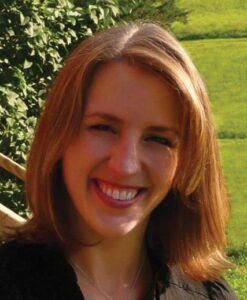
“I want to show how meticulous and careful we’re being and how much work we’re putting into this to make sure it is safe and effective,” Sweeney Efferen said during her November 12 virtual presentation, “The Vaccine Pipeline: Developing Safe and Efficacious Vaccines to Protect Against Some of our World’s Most Serious Threats.” The event was hosted by Trinity College’s Virtual Long Walk, the Trinity Institute for Interdisciplinary Studies, and Trinity’s Biology Department. The full presentation is available below or can be viewed on YouTube here.
Sweeney Efferen graduated from Trinity in 2003 with honors in biology and then earned a Ph.D. in microbiology and immunology from the Albert Einstein College of Medicine, where she worked on developing a vaccine for tuberculosis. At Pfizer, she manages the discovery and early development phases of vaccine production for RNA-based vaccines and is currently working closely with clinical, commercial, and regulatory groups to get the COVID-19 vaccine approved and distributed.
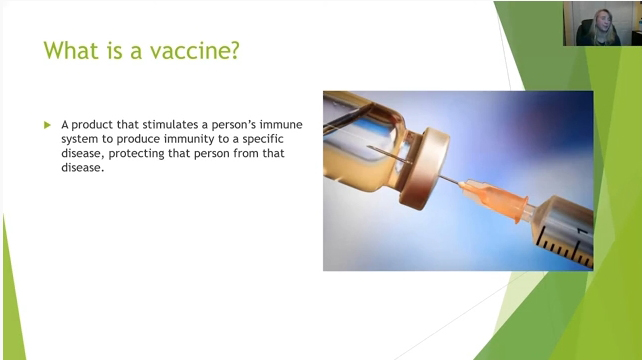 Following a welcome by TIIS Co-Director Christoph Geiss, professor of physics and environmental science, Sweeney Efferen was introduced by Lisa-Anne Foster, associate professor of biology. During her presentation, Sweeney Efferen fielded questions from live viewers that were gathered by Foster and TIIS Co-Director Beth E. Notar, associate professor of anthropology.
Following a welcome by TIIS Co-Director Christoph Geiss, professor of physics and environmental science, Sweeney Efferen was introduced by Lisa-Anne Foster, associate professor of biology. During her presentation, Sweeney Efferen fielded questions from live viewers that were gathered by Foster and TIIS Co-Director Beth E. Notar, associate professor of anthropology.
Sweeney Efferen explained that a vaccine is a product that stimulates a person’s immune system to produce immunity to a specific disease, which protects them against that disease. “With a vaccine, the intention is for you to never get sick… and never spread [a disease] to other people,” she said.
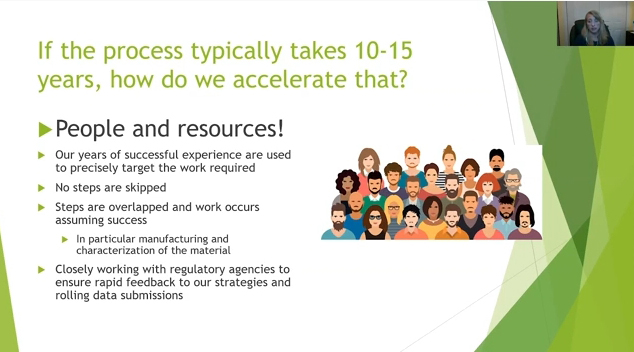 The typical vaccine development timeline is 10 to 15 years, according to Sweeney Efferen. “It’s a very slow, methodical process,” she said. To complete the process more quickly, as the current COVID-19 pandemic demands, Pfizer has turned nearly all of its focus to this one project. “We don’t skip any steps… we just put more people and resources on it,” she said. “We are closely working with regulatory agencies to ensure rapid feedback, so people can go back to their regular lives.”
The typical vaccine development timeline is 10 to 15 years, according to Sweeney Efferen. “It’s a very slow, methodical process,” she said. To complete the process more quickly, as the current COVID-19 pandemic demands, Pfizer has turned nearly all of its focus to this one project. “We don’t skip any steps… we just put more people and resources on it,” she said. “We are closely working with regulatory agencies to ensure rapid feedback, so people can go back to their regular lives.”
During her presentation, Sweeney Efferen talked about the different types of vaccines, how they are tested in animal and human trials, and the approvals process that all vaccines must go through in order to demonstrate their safety and efficacy. “If you can’t reproduce it, it’s not science,” she said.
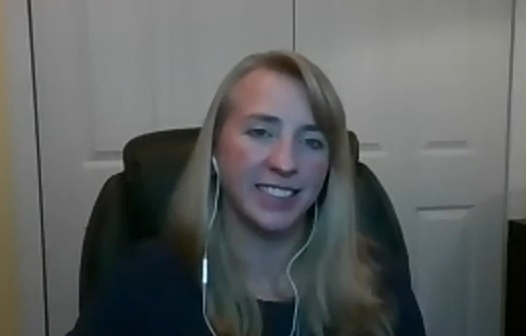
The distribution and shipping of a frozen vaccine has certain challenges, Sweeney Efferen said, namely how to keep the vaccine very cold. “We’ve been working on strategies to handle cold chain storage,” she said. These strategies include the use of dry ice, special containers, and new labels for the vials that display whether a vaccine was ever exposed to too high a temperature during transportation. “Once we get our Emergency Use Authorization [from the U.S. Food and Drug Administration] we can start our distribution immediately,” she said.
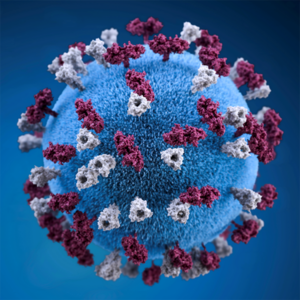 While she said that not everyone can be vaccinated—due to specific health conditions or allergies—Sweeney Efferen emphasized the importance of achieving “herd immunity” through vaccinations. She said, “What we try to do is to promote that enough people get vaccinated within the population to prevent people who can’t get vaccinated from getting infected… We have to immunize a good portion of the community to be effective.”
While she said that not everyone can be vaccinated—due to specific health conditions or allergies—Sweeney Efferen emphasized the importance of achieving “herd immunity” through vaccinations. She said, “What we try to do is to promote that enough people get vaccinated within the population to prevent people who can’t get vaccinated from getting infected… We have to immunize a good portion of the community to be effective.”
Sweeney Efferen added that she appreciated the questions that came from the Trinity community during her presentation. “Part of our desire [at Pfizer] is to educate people so that they feel more comfortable with the work we do and the care we take to make sure that everything is safe,” she said. “We’re working hard and we want everyone to get back to normal.”
